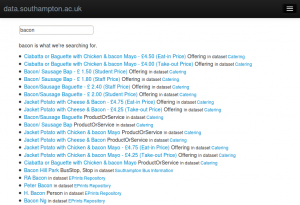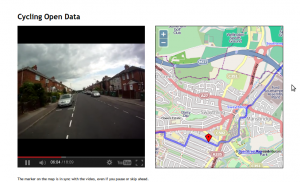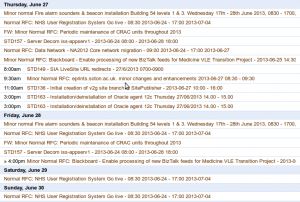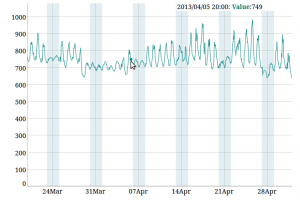Video
Open Data Open Day – Hackers summary
June 27, 2013
by Patrick McSweeney
As you know from Ash’s previous post ran an Open Data Open Day for people in the University to come and learn about open data. As part of the event we invited the University top hackers to come and do some open data hacking. The template is one familiar to many of you who have attended our events or JISC hack days before. Simply get hackers to sit down together, form into teams of 2-5 people, give them a blank slate, float some ideas, keep coffee on tap and periodically wheel food in and out. At the end of the day go to the bar so that each team can present what they have been working on over a hard earned beer.
One of the key aims for the day was to link up people who had data with people who could do something cool with it. The hack day is a good way to do this because you have a room full of people who can do something cool. Then over the course of the day people with data drop by and talk to the hackers, tell them about there data and get ideas to do cool stuff. It is a friendly and informal environment to work in and people come out with some really good ideas. What always surprises me is, even though I have participated in at least 30 and run at least 5, the outputs from the day are always so amazing good. This hack day was no exception and our teams came out with a combination of the awesomely cool and mind-bogglingly useful stuff.
The outputs were:
LOD Search and the data.southampton.ac.uk usability study
Collin Williams (CISCO Systems) , Rikki Prince, Biscuits Newton and Andreas Galazis Decided the usability of data.southampton.ac.uk was not good enough for non-technical people. They performed a usability study of the site and identified key areas of weakness to feed back to us. The biggest problem they found was that the search on data.southampton was nearly unusable. To combat the problem they created LOD Search, a SPARQL smart search indexing tool which can generate a usual search engine on any SPARQL end point. The demo they presented was very very impressive and prompted a lot of questions from the audience. Attempts to trip up the system by asking for difficult things gave it no trouble at all and the interface was surprisingly good given the short time available to work on it.
Adam Field (iSolutions), Matt Smith (iSolutions) and Lisha Chen-Wilson (iSolutions) met Adam Tewksbury from the University transport office. He was looking for a cool map and video of cycle routes which he can embed in the transport website and attach to the open data pages and maps. The team took helmet cam videos and GPS data about the route and combined them to make cool video which moves the pointer on an open street map as the the video plays. The technique is very powerful and reproducible for any combination of video and GPS data in KML or CSV format. Hopefully this will result in more students and staff getting on to their bikes to cycles the safe routes of Southampton.
Exchange Calendar to iCal
Martin Chivers (iSolutions) spent a chunk of the morning in talks learning about the nuts and bolts of open data. In the afternoon he grabbed a laptop and cracked really big data.southampton.ac.uk walnut. He created a commandline tool which exports a exchange calendar as iCal. One of our big bug bears in open data has been getting data out of exchange and this tool hit the problem squarely on the head. In the past we have had to ask users with temporal data to set up an account on Google calendar since we can get data out of it but not from our own exchange server. Now users will be able to work in their normal workflow without having to use a tool outside of the University to do a fair ordinary task. As a demo he was kind enough to give us the iSolution change management calendar as open data.
Exchange Calendar to iCal on github
Southampton Blackout the real story
Tyler Ward (ECS) was more of a victim of circumstance than a hacking volunteer at our Hack Day. He was collocated with us to work on ECS’s media sensation Erica the Rhino but since he is keen got caught up in the open data hackery. The University of Southampton ran a media campaign called the Southampton Blackout to promote efficient power use at the University. The write up from our Comms team had some interesting mathematical inaccuracies which made the integrity of the finds questionable. Tylers aim was to use open energy usage data to tell the real story of the Southampton blackout. What he found is that some buildings during the blackout were using more energy not less to a level which almost eclipses the savings made in other buildings. He found some interesting trends in the data particularly in the figure below for ECS Mountbatten Silcon Fab lab. His close analysis of data was able to deduce where future campaigns should be targeting next an where savings can be made most easily.
All in all the day was a great success and lots of fun for the hackers involved. To quote Adam Field:
I had fun. It’s not often that I can take a problem and spend a day solving it.
Data.Southampton Talk at SWIB2011
February 10, 2012
by Christopher Gutteridge
This is a video & slides from a talk I gave at SWIB2011.
-
View the Slides (PPTX)




